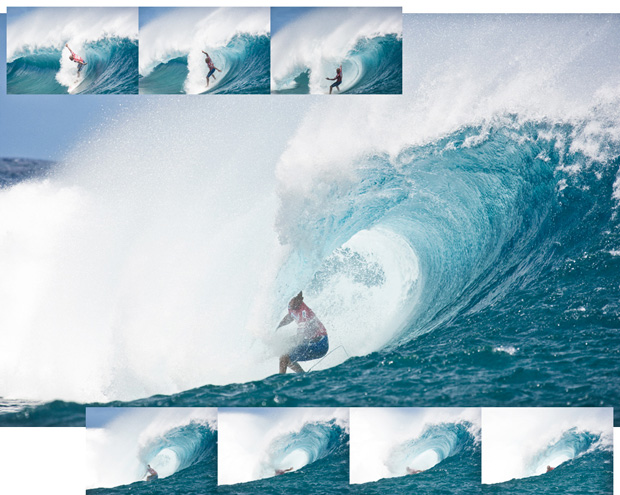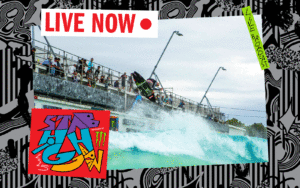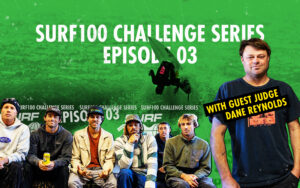ASP judge, Pritamo Ahrendt discusses conflict and criteria
It’s among the surfing world’s toughest jobs. For every complaint levelled by pro surfers – money, bad waves, time spent away from loved ones, pressure and contract negotiations – consider the judges. They suffer it all but for less coin and even less time in the water. Not to mention the endless criticism. Here, 33-year-old rotating head judge and Byron Bay resident (when he’s not on the road) Pritamo Ahrendt answers to claims the judges are kooks, recounts his most stressful day at the office and tells us what it’s like to sit down for dinner next to the guy whose career you just ruined. Stab: Describe your job. Pritamo Ahrendt: ASP International Head Judge and ASP Judge. I work at all ASP World Tour events and about 10 Prime and Star events throughout a year. This is my 12th year full-time judging at the ASP World Tour level. The positives? It’s a privilege to have the opportunity to watch the highest level of surfing and be one of the few that get to critically analyze it and ultimately decide the World Champion. The life experiences involved in traveling are epic too. Negatives? Being consistent and critical in your judgment. Surfing is very subjective with a constantly changing platform that surfers perform on which can make it challenging. Outside the job, it can be hard being away from the girlfriend and family and not having much of the stability of having a home and living somewhere. I’m living out of my suitcase from now until early January, but not complaining, life is good. And the criticisms – Are you guys lacking quality surfers as judges? Definitely not. In Tahiti for example, we had a very strong panel of surfer judges. Luli Pereira (Brazil) surfed the WQS and rips. Wade Sharp, (South Africa) is a past pro and throws buckets. I had a pro am/pro junior career. Rich Porta competed on the amateur circuit for years. There are plenty more I could mention that work with us that rip – Jeff Klugel, Ian “Ratso” Buchan, Icaro Caveleiro, Luiz Dantas, Davey Shipley and Ben Lowe to mention a few. The panel is solid. What level of surfer must you be to be a good judge? Nearly every judge at this level have surfing careers as their backgrounds and the ones that don’t are all good surfers and have other strong attributions to be a top end judge. Most people might not know who the judges are, but all the judges are known surfers in their country or area. How has the judging game changed since you began?Best two waves compared to three or four to push the surfer to go after two huge scores rather than play the safe game. Improved criteria: The removal of “longest functional distance” and “biggest and best waves”. Now it’s not about the wave and how far you ride it but the surfing you perform on it. Secondly, the addition of “variety of repertoire”, “innovative and progressive surfing” and, more recently, simplifying it into point form and adding “combination of major manoeuvres”. The criteria allows innovative and progressive moves to be rewarded but it’s up to the surfers to push their limits. Video replay system: We can access individual waves throughout a heat or day and review them to keep our comparisons accurate and any priority or interference situations. Individual monitors and large TV screen monitors are used. A replay operator logs all waves ridden and they’re stored for instant playback. Jet ski assist: Less time wasted paddling, more time surfing. And safer. Rotating Head Judge: At each world tour event we now have three head judges that rotate, led by ASP International Head Judge Rich Porta. The three of us also rotate into the panel as scoring judges. Level of surfing: Surfers don’t just want to win but want to impress their peers, the public and the judges so much that they are showing their full ability in heats. What incentive is there to become a judge? It’s a rewarding job – lots of surfing, excellent office to work in, exotic locations, and decent pay. Definitely a lifestyle job. Surfers know who you are and it’s not uncommon for you to share restaurants, lineups and convenience store queues with them. Do irate surfers ever approach you outside of hours over a tough call? Honestly, when I first started in 1999, the surfers were much more aggressive and fiery and there were often blow ups and altercations and a fair bit of vibing but over the last 8 or so years we have built up a lot more respect and there is rarely more than the odd verbal tirade, which is usually fined. I haven’t been approached other than the odd query or heat of the moment vibe in a long time. There is a protocol with which surfers need to fill out a complaint form and hand it to the beach marshal and it’s dealt with at the end of the round or. I’m sure its hard for the surfers sometimes when they lose heavy, close heats then see us in the surf, at the restaurant, at the hotel and at the airport. But honestly, I feel there is quite a cool respect from the surfers. When you watch any sport, the judges and the referees are always getting criticised. They’re the ones making the hard calls and most of the punters are out there not knowing all the rules and the ins and outs of a sport. Most people just love the controversy. Can you recount one of your most tense days at the office? The 2003 Pipe Masters when K.S (Kelly Slater) and A.I (Andy Irons) were going head to head for the title. They surfed the heat after each other from the 4th Rd. There were literally seven heats in one day that could have decided the ASP World Title. The judges’ whole year of work and the two surfers’ whole year of competing came down to one day. That’s
It’s among the surfing world’s toughest jobs. For every complaint levelled by pro surfers – money, bad waves, time spent away from loved ones, pressure and contract negotiations – consider the judges. They suffer it all but for less coin and even less time in the water. Not to mention the endless criticism. Here, 33-year-old rotating head judge and Byron Bay resident (when he’s not on the road) Pritamo Ahrendt answers to claims the judges are kooks, recounts his most stressful day at the office and tells us what it’s like to sit down for dinner next to the guy whose career you just ruined.
Stab: Describe your job.
Pritamo Ahrendt: ASP International Head Judge and ASP Judge. I work at all ASP World Tour events and about 10 Prime and Star events throughout a year. This is my 12th year full-time judging at the ASP World Tour level.
The positives? It’s a privilege to have the opportunity to watch the highest level of surfing and be one of the few that get to critically analyze it and ultimately decide the World Champion. The life experiences involved in traveling are epic too.
Negatives? Being consistent and critical in your judgment. Surfing is very subjective with a constantly changing platform that surfers perform on which can make it challenging. Outside the job, it can be hard being away from the girlfriend and family and not having much of the stability of having a home and living somewhere. I’m living out of my suitcase from now until early January, but not complaining, life is good.
And the criticisms – Are you guys lacking quality surfers as judges? Definitely not. In Tahiti for example, we had a very strong panel of surfer judges. Luli Pereira (Brazil) surfed the WQS and rips. Wade Sharp, (South Africa) is a past pro and throws buckets. I had a pro am/pro junior career. Rich Porta competed on the amateur circuit for years. There are plenty more I could mention that work with us that rip – Jeff Klugel, Ian “Ratso” Buchan, Icaro Caveleiro, Luiz Dantas, Davey Shipley and Ben Lowe to mention a few. The panel is solid.
What level of surfer must you be to be a good judge? Nearly every judge at this level have surfing careers as their backgrounds and the ones that don’t are all good surfers and have other strong attributions to be a top end judge. Most people might not know who the judges are, but all the judges are known surfers in their country or area.
How has the judging game changed since you began?Best two waves compared to three or four to push the surfer to go after two huge scores rather than play the safe game. Improved criteria: The removal of “longest functional distance” and “biggest and best waves”. Now it’s not about the wave and how far you ride it but the surfing you perform on it. Secondly, the addition of “variety of repertoire”, “innovative and progressive surfing” and, more recently, simplifying it into point form and adding “combination of major manoeuvres”. The criteria allows innovative and progressive moves to be rewarded but it’s up to the surfers to push their limits. Video replay system: We can access individual waves throughout a heat or day and review them to keep our comparisons accurate and any priority or interference situations. Individual monitors and large TV screen monitors are used. A replay operator logs all waves ridden and they’re stored for instant playback. Jet ski assist: Less time wasted paddling, more time surfing. And safer. Rotating Head Judge: At each world tour event we now have three head judges that rotate, led by ASP International Head Judge Rich Porta. The three of us also rotate into the panel as scoring judges. Level of surfing: Surfers don’t just want to win but want to impress their peers, the public and the judges so much that they are showing their full ability in heats.
What incentive is there to become a judge? It’s a rewarding job – lots of surfing, excellent office to work in, exotic locations, and decent pay. Definitely a lifestyle job. Surfers know who you are and it’s not uncommon for you to share restaurants, lineups and convenience store queues with them.
Do irate surfers ever approach you outside of hours over a tough call? Honestly, when I first started in 1999, the surfers were much more aggressive and fiery and there were often blow ups and altercations and a fair bit of vibing but over the last 8 or so years we have built up a lot more respect and there is rarely more than the odd verbal tirade, which is usually fined. I haven’t been approached other than the odd query or heat of the moment vibe in a long time. There is a protocol with which surfers need to fill out a complaint form and hand it to the beach marshal and it’s dealt with at the end of the round or. I’m sure its hard for the surfers sometimes when they lose heavy, close heats then see us in the surf, at the restaurant, at the hotel and at the airport. But honestly, I feel there is quite a cool respect from the surfers. When you watch any sport, the judges and the referees are always getting criticised. They’re the ones making the hard calls and most of the punters are out there not knowing all the rules and the ins and outs of a sport. Most people just love the controversy.
Can you recount one of your most tense days at the office? The 2003 Pipe Masters when K.S (Kelly Slater) and A.I (Andy Irons) were going head to head for the title. They surfed the heat after each other from the 4th Rd. There were literally seven heats in one day that could have decided the ASP World Title. The judges’ whole year of work and the two surfers’ whole year of competing came down to one day. That’s a lot of high-pressure situations. The title was decided in the final and there was almost an interference situation, which would have made it even gnarlier. – Jed Smith














Comments
Comments are a Stab Premium feature. Gotta join to talk shop.
Already a member? Sign In
Want to join? Sign Up